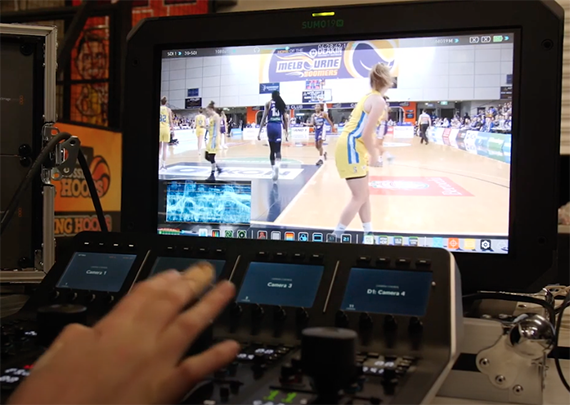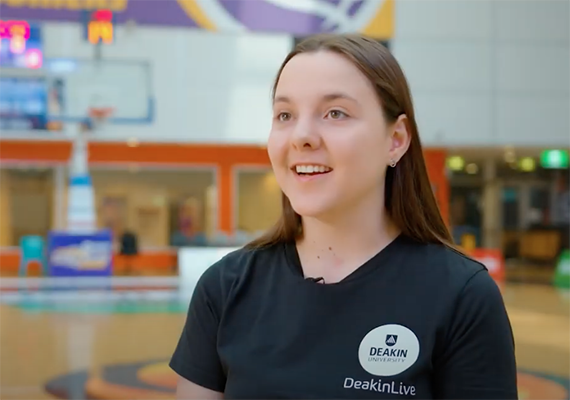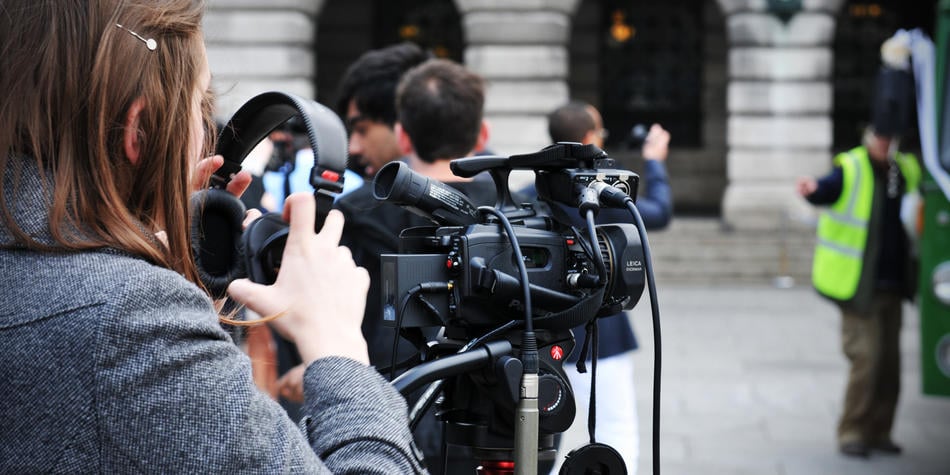Dreaming of working in film, television or animation? You’re certainly not alone – but jobs in these exciting industries are highly competitive and often tricky to land.
So how do you get the hands-on experience and contacts needed to get a foot in the door?
Ask Deakin’s Bachelor of Film, Television and Animation graduates, who have landed employment in everything from TV comedies, to live streaming sporting matches, documentary making, directing, and reality TV.
A world of opportunities
Liz Baulch from the course teaching team says many students enrol in this degree with dreams of being a director or cinematographer.
And while the course does provide highly practical experience in those areas, it also introduces students to countless opportunities they may not have considered (or even known about).
‘We start opening their eyes to what producers do, what happens in post-production, along with animation,’ Baulch says.
‘They come into the television studio and they work, in a sense, in a live environment. Often they’ll love that experience so much that they’ll go, “oh I want to work in television now”.’
Practical skills from day one
In their first year, students begin learning fundamental practice or production skills – such as shooting, editing and animation.
Later, there are a range of practical genre and form units, including in narrative film, television studio production, experimental film and documentary.
All the way, students learn and practice the collaborative skills that will be vital in their future careers.
‘A lot of these units involve group work because filmmakers don’t work alone,’ Baulch says.
There’s also a focus on specialist craft skills, such as a hands-on cinematography unit involving plenty of shooting, and a sound unit where students record and create soundtracks.
A post-production unit provides the opportunity to learn the skills and techniques of editing and colour grading, while a directing unit allows students to practice and refine their techniques.

Deakin Live sports broadcasts
Dr Simon Wilmot talks about the industry programs students from film, television, animation and journalism work on.
Hands-on internships
During the degree, students complete an internship of about 100 hours.
‘In the past, the internships have been incredibly varied. We’ve had people working on (TV drama) Wentworth, from corporate productions to sports productions to online media,’ Ms Baulch says.
‘We had someone on The Block this year, shooting the background footage of the finished rooms.’
Student Sarah Thomas completed her internship at the end of 2019, working as a director with Deakin Live, an industry partnership that livestreams Melbourne Boomers basketball games.
Sarah says the internship provided valuable experience in working with a team and ‘making sure all the pieces fit together properly’.
‘The internship was fun; I feel like I did learn a lot – not just about being a director but also the different roles involved and the different way that a live broadcast is set up.’
She says she was able to apply the knowledge she’d gained through the television unit she’d studied at Deakin, which taught her the foundations of live broadcasting.
Apart from honing valuable skills, Sarah says the Deakin Live internship also led to an exciting paid opportunity at the Australian Open.
During the past two tennis championships, she has worked in various roles including as an assistant graphics operator and media ingest logger – and hopes to return to Melbourne Park next year.
Deakin Live Sport Broadcasting Practicum student profile
Learn about the work that Deakin student Sarah Thomas undertook in her role as Director of the Deakin Live Sport Broadcast of Deakin Melbourne Boomers WNBL games.

Other internship options
Baulch says Deakin students have also completed internships with industry partners such as AFL media, Netball Australia, post-production mixing houses and a theatre company’s film production.
In one instance, Deakin students pitched a youth online television program to the AFL, and went on to make it.
In another, a student worked in the costume department of Surviving Summer, a TV drama filmed on the Surf Coast that will be screened on Netflix.
Film festivals and awards
For those set on a career in filmmaking, Baulch says it’s incredibly important that students get their name and work in front of as many eyeballs as possible.
Each year, Deakin staff select some of their students’ best work for entry into the ATOM Awards.
‘The ATOM Awards have got quite a high profile because they’re run by the Australian Teachers of Media and they have quite a bit of industry buy-in,’ Baulch says.
‘They’re certainly well-known and regarded and they have an industry category, a tertiary category and a high school student category.’
Other students submit their films for inclusion in events such as the St Kilda Film Festival off their own bat.
In their third year, Deakin film students create their own short film, and an accompanying strategy that identifies which festivals they’ll target to showcase their work.
‘That’s something we bang on about all the time – the importance of getting your work out there – because that’s the only way you progress as a filmmaker,’ Baulch says.
Master the art of producing and directing in Deakin’s Bachelor of Film, Television and Animation.

